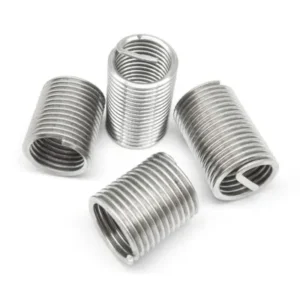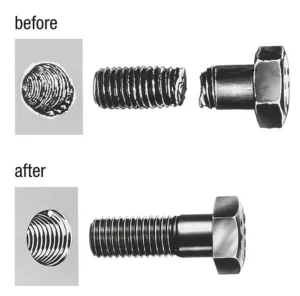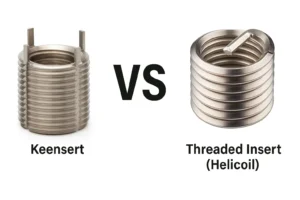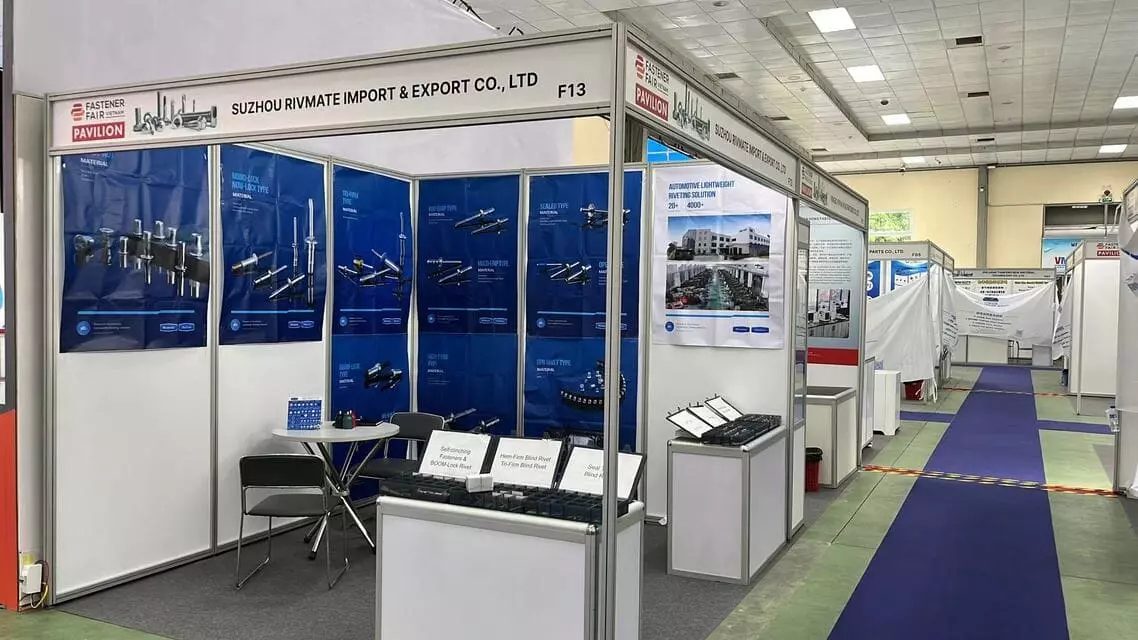What is Rivet Nut DIN Standard?
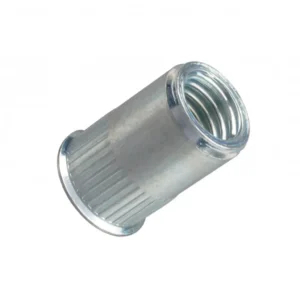
Leading Rivet Nut Manufacturer and Supplier in China

The DIN standard for rivet nuts defines a set of specifications for the design, dimensions, and performance of these fasteners, ensuring consistency and reliability across different applications. When asking “What is Rivet Nut DIN Standard?“, it refers to the internationally recognized German standards that govern the quality and performance of rivet nuts used in industries such as automotive, aerospace, and construction.
Table of Contents
DIN Standard: Basic Overview

DIN (Deutsches Institut für Normung) is the German national standards organization that develops and publishes standards for various industries and products, including rivet nuts. It ensures that products and processes meet consistent and reliable quality, safety, and regulatory requirements, particularly within Germany and Europe.
The DIN standard for rivet nuts governs key aspects such as dimensions, materials, strength, and performance characteristics, ensuring that rivet nuts meet the needs of specific applications. DIN-certified rivet nuts are commonly used in automotive, aerospace, machinery, and construction industries, where precise engineering and high-quality standards are crucial for safety and performance.
Manufacturers use DIN standards to ensur e compatibility within the European market and comply with regional regulations, making DIN-certified rivet nuts essential for many industrial applications.
What is Rivet Nut DIN Standard?
The Rivet Nut DIN standard refers to a set of guidelines and specifications developed by the German national standards organization, DIN (Deutsches Institut für Normung), for the manufacturing, performance, and application of rivet nuts. These standards ensure that rivet nuts meet specific requirements for quality, safety, and performance, particularly within the European market. DIN standards focus on various characteristics, such as dimensions, material properties, thread sizes, and strength, to ensure that rivet nuts perform reliably in their intended applications.
The most commonly referenced DIN standard for rivet nuts is DIN 7337, which covers the design and manufacturing specifications for blind rivet nuts.
1. Dimensions
Key dimension-related aspects covered in the DIN standard include:
- Thread Size: The standard defines thread sizes that rivet nuts must adhere to, ensuring compatibility with corresponding bolts or screws. Common thread sizes follow the metric system (e.g., M6, M8, M10, etc.).
- Outside Diameter (OD): The OD refers to the outer diameter of the rivet nut before installation. It needs to match the hole size in the material for proper expansion and a secure grip.
- Length: The length determines the grip range, which is the thickness of the material the rivet nut can fasten to.
- Flange Diameter: The flange of the rivet nut serves as the surface that prevents it from pulling through the material.
- Hole Size: The hole must be slightly larger than the rivet nut’s outside diameter to allow for proper expansion.
2. Materials
The Rivet Nut DIN Standard outlines the materials used to manufacture rivet nuts, ensuring they meet performance, durability, and application-specific requirements.
- Offers high strength, durability, and wear resistance, making it suitable for heavy-duty applications.
- Commonly used in automotive, construction, and industrial equipment.
- Often galvanized or coated to enhance corrosion resistance.

- Provides excellent corrosion resistance, high strength, and long-term durability, even in harsh environments.
- Ideal for marine, chemical processing, and outdoor applications where exposure to moisture and corrosive agents is frequent.
- Common grades include A2 (304) and A4 (316), as specified by the DIN standard.

- Lightweight and corrosion-resistant, but with lower strength compared to steel and stainless steel.
- Used in applications where weight reduction is a priority, such as aerospace, electronics, and automotive lightweighting.
- Anodized or coated to improve wear resistance.
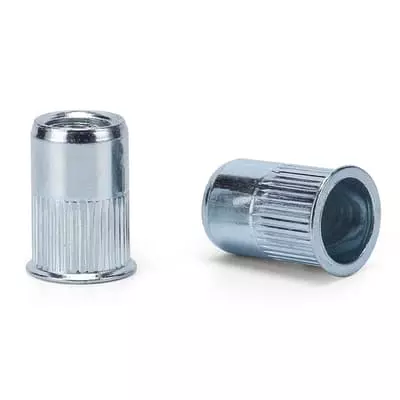
- Provides excellent machinability and corrosion resistance, along with good electrical conductivity.
- Commonly used in electrical and decorative applications due to its aesthetic appeal and conductivity.

The DIN Standard for rivet nuts specifies the mechanical properties required to ensure strength, durability, and performance. These standards define tensile and shear strength based on material type, thread size, and application requirements.
| Material | Thread Size (M) | Tensile Strength (N) | Shear Strength (N) | Application Examples |
| Steel (Grade 8.8) | M6 | 800 MPa (116,000 psi) | 500-600 MPa (72,500–87,000 psi) | Automotive, machinery, heavy equipment |
| Stainless Steel (A2-70) | M6 | 500-700 MPa (72,500–101,500 psi) | 400-600 MPa (58,000–87,000 psi) | Corrosive environments, marine, chemical |
| Aluminum | M6 | 300-400 MPa (43,500–58,000 psi) | 200-300 MPa (29,000–43,500 psi) | Lightweight applications, aerospace |
4. Surface Finish
Zinc Plating (DIN 50961): A common finish that provides corrosion resistance by forming a protective zinc coating on the rivet nut’s surface. This is suitable for general applications, especially in moderate environments.
Nickel Plating (DIN 50062): Offers superior corrosion resistance and is often used in applications where the rivet nut will be exposed to more extreme conditions, such as marine or industrial environments.
Hot-Dip Galvanizing (DIN EN ISO 1461): A more robust finish, providing excellent corrosion resistance for rivet nuts used in outdoor or heavy-duty industrial applications.
Chromate Conversion Coating (DIN EN 12206): Used to provide corrosion resistance and enhance the appearance of the rivet nut, typically in applications where aesthetics are important in addition to durability.
What are the Common DIN Standard Rivet Nuts?
DIN 7337 –
This standard covers the most common type of rivet nuts, typically used for thin-walled materials. It ensures a secure threaded insert for fastening bolts and screws in applications like automotive, machinery, and electronics.DIN 975 –
This standard applies to rivet nuts used in more demanding applications, where higher load-bearing capabilities are required. It is often found in industrial and construction uses.DIN 358 –
A standard for blind rivet nuts with a wide range of applications, including in automotive and aerospace sectors, offering a strong grip and consistent performance.DIN 6701 –
This standard is typically used for rivet nuts with a specific design, focusing on certain load requirements and materials, and is common in structural applications.
Do You Have Any Questions?
Let Us Solve Your Problem
DIN Standard Rivet Nuts vs ISO Standard Rivet Nuts
1. Origin & Geographical Focus
- DIN standards are developed by the German Institute for Standardization, while ISO standards are developed by the International Organization for Standardization.
- DIN standards are primarily used in Europe, particularly Germany. ISO standards are globally recognized and used across various regions, ensuring compatibility in international markets.
- DIN-certified rivet nuts often have more stringent European safety and regulatory requirements. ISO certification ensures compliance with global trade and regulatory standards.
2. Material Specifications
- DIN standards often focus on specific European material grades.
- ISO standards provide broader material choices for international markets.
3. Thread Sizes
- DIN standards typically focus on smaller sizes up to M24, while ISO standards offer a broader range, including sizes up to M30.
- While both standards use metric threads, ISO is more widely recognized globally, while DIN is specific to European markets.
4. Strength & Durability
DIN Standard Rivet Nuts:
DIN standard rivet nuts are designed to meet rigorous strength requirements for European industrial applications. The strength varies based on material, size, and thread pitch, with typical tensile strengths ranging from 6,000 to 20,000 psi for steel rivet nuts.ISO Standard Rivet Nuts:
ISO standard rivet nuts offer similar strength levels but with more consistent criteria across various industries. ISO rivet nuts typically meet tensile strengths of 6,000 to 25,000 psi, depending on material and application requirements.
5. Application Range
- DIN Standard Rivet Nuts: Commonly used in automotive, machinery, and industrial applications in Europe.
- ISO Standard Rivet Nuts: Widely used across industries such as automotive, aerospace, and electronics globally.
Key Differences:
- Geographical Use: DIN is more common in Europe, while ISO is a globally recognized standard that facilitates international trade and consistency across regions.
- Certification: DIN standards are often more stringent with European-specific safety and regulatory requirements, while ISO focuses on broader compliance with international norms.
- Material & Thread Specifications: While both standards provide detailed specifications, ISO generally offers a more diverse range of materials and thread sizes to accommodate international needs.
Where can I Buy Rivet Nuts to DIN Standards?
Knowing where to buy rivet nuts and finding the right DIN compliant rivet nut supplier can have a significant impact on the overall success of the project.
1. Offline Fastener Stores
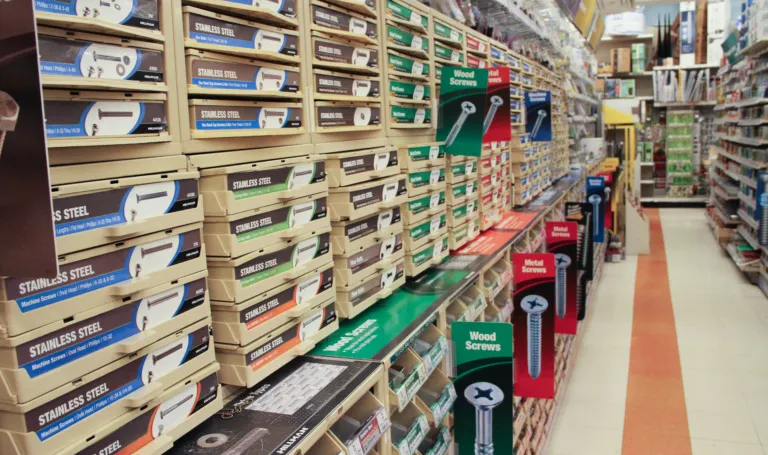
Offline fastener stores are physical locations that sell a wide variety of fasteners, including rivet nuts that meet DIN standards. These stores are typically found in industrial zones or commercial areas and offer the convenience of inspecting products in person. You can speak directly with staff for technical advice and assistance, making it easier to find the exact product needed for your project.
However, offline stores might have limited stock, especially for specialized sizes or large quantities. Prices in these stores may also be higher compared to bulk or online purchases. If you need a specific type of rivet nut or high volume, it might be more cost-effective to look at other purchasing options.
2. Online Retail Marketplaces

Online retail marketplaces like Amazon, eBay, and Alibaba offer a wide selection of rivet nuts, including those that meet DIN standards. These platforms provide the convenience of browsing from home, comparing prices, and finding various sizes, materials, and brands. With international shipping, you can often find suppliers offering competitive pricing on bulk orders.
While online shopping offers convenience, there are risks like receiving incorrect products or dealing with unreliable sellers. It’s important to verify product specifications and choose sellers with good ratings. Delivery times can vary, and it might take longer to receive your items depending on shipping options.
3. Specialized Rivet Nut Suppliers
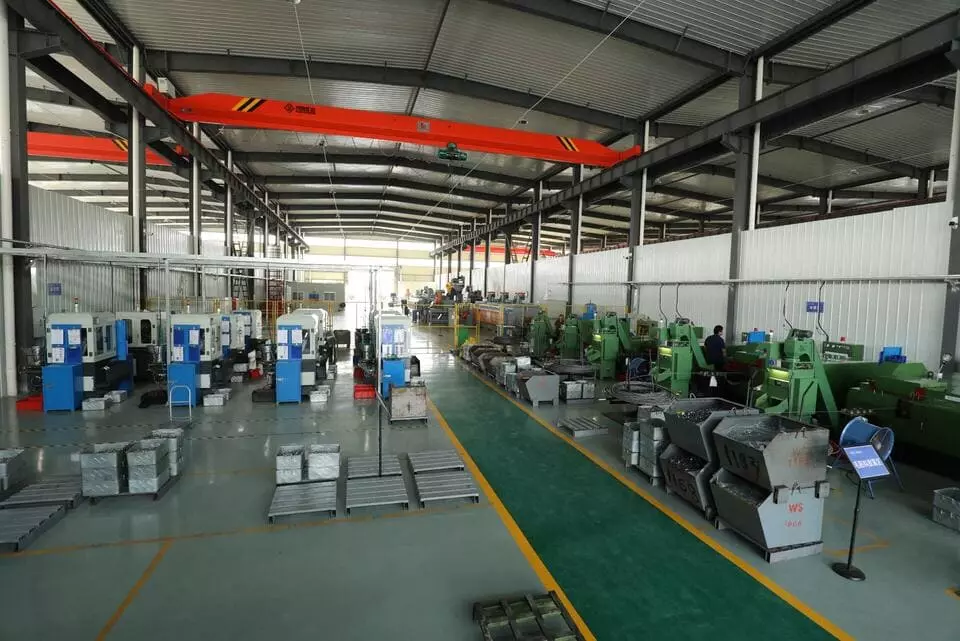
Specialized rivet nut suppliers focus on providing fasteners that meet specific standards, such as DIN. These suppliers often offer high-quality products, customized solutions, and bulk orders. Many have technical support available to help you choose the right rivet nut for your needs, and they offer additional services like fast delivery and competitive pricing for large orders.
These suppliers can be a more expensive option compared to general marketplaces or local stores, especially if you’re ordering smaller quantities or customized products. However, for large-scale projects or applications that require precision, purchasing from a specialized supplier ensures that you’re getting the best quality rivet nuts that comply with DIN standards.
Companies like Rivetfix, which specializes in rivet nuts, can help you source DIN-standard products with detailed specifications and testing for quality assurance.
Do You Have Any Questions?
Let Us Solve Your Problem
Rivetfix stands out as a leading supplier of high-quality rivet nuts, specializing in DIN standard products. With an extensive selection, competitive pricing, and exceptional customer support, Rivetfix is your go-to source for sourcing DIN-standard rivet nuts. The company offers expert guidance to help you choose the right products for your specific application needs. When you choose Rivetfix, you’re not just buying fasteners—you’re investing in consistent quality, timely delivery, and a partner who understands your project requirements.
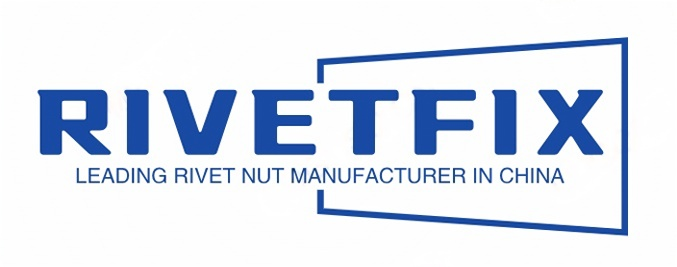
Select Rivetfix for Your Next Project Endeavor
As a leading fastener manufacturer in China with more than 15 years in the industry, Rivetfix are committed to providing first-class quality fasteners and responsive services to the world.
Our factory manufactures 400 million pieces of structural rivets and automobile blind rivets, 1 billion standard blind rivets annually now. We can select the most suitable fasteners according to your project needs, and provide product customization services. Choose Rivetfix for your next project and experience the difference that superior rivet nut solutions can make.
Contact us for project advice and the latest rivet nut quote!
Get High Quality Rivet Nuts Quote!
Send Your Rivet Nut Request
For more than 20 years, Rivetfix has helped customers solve many rivet nuts sourcing needs and technical challenges.
Have a question? Contact us and we’ll provide you with the perfect solution.


